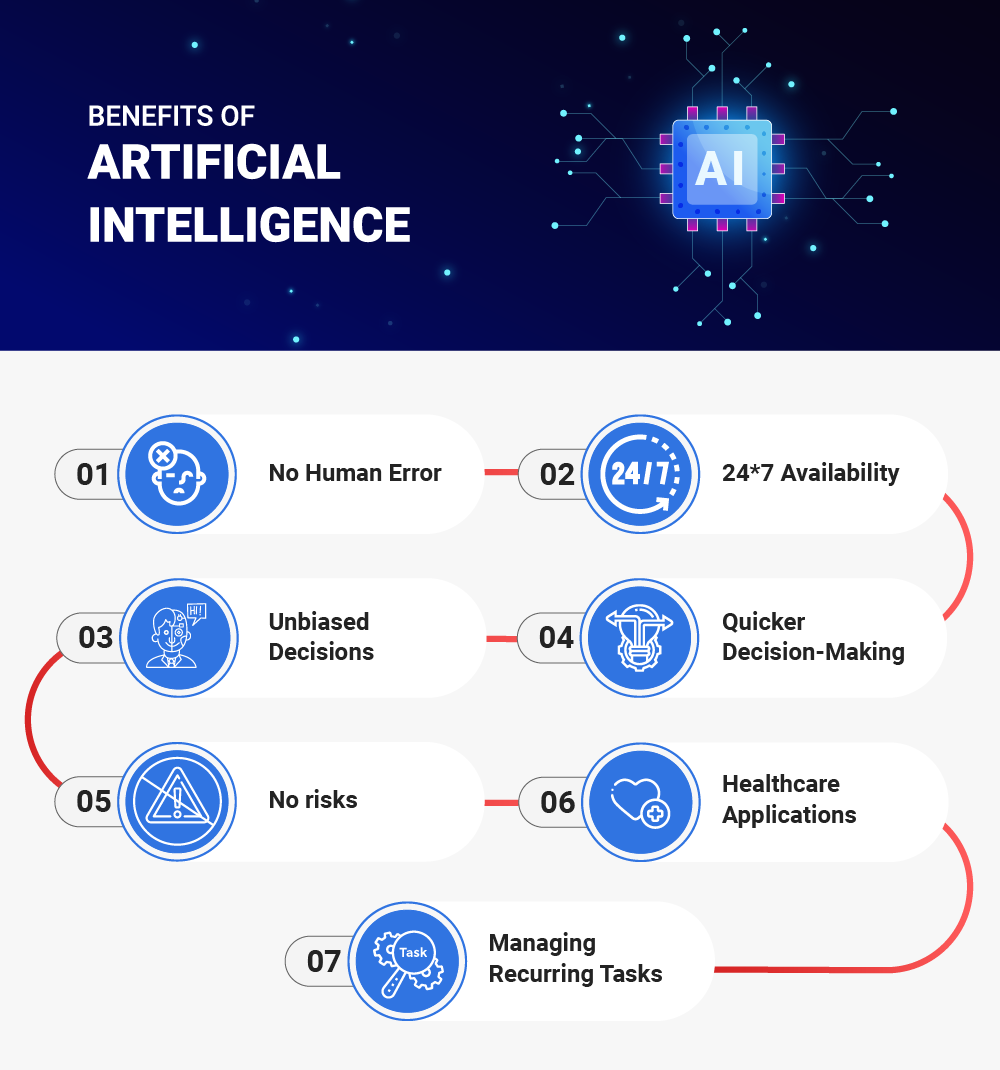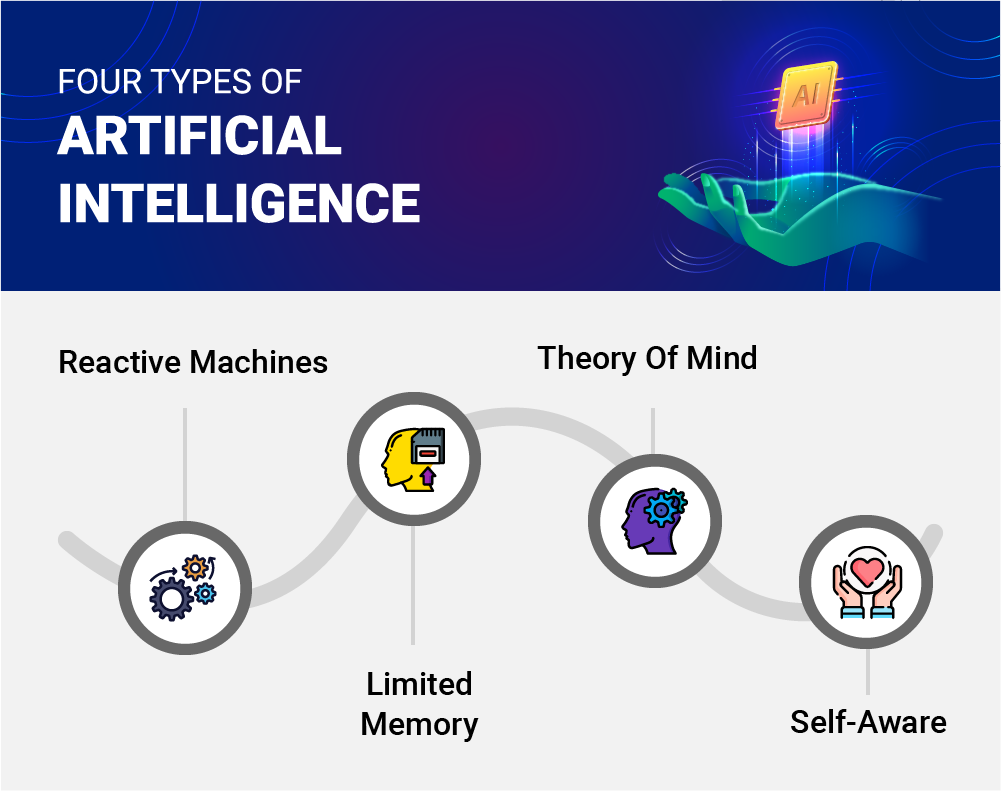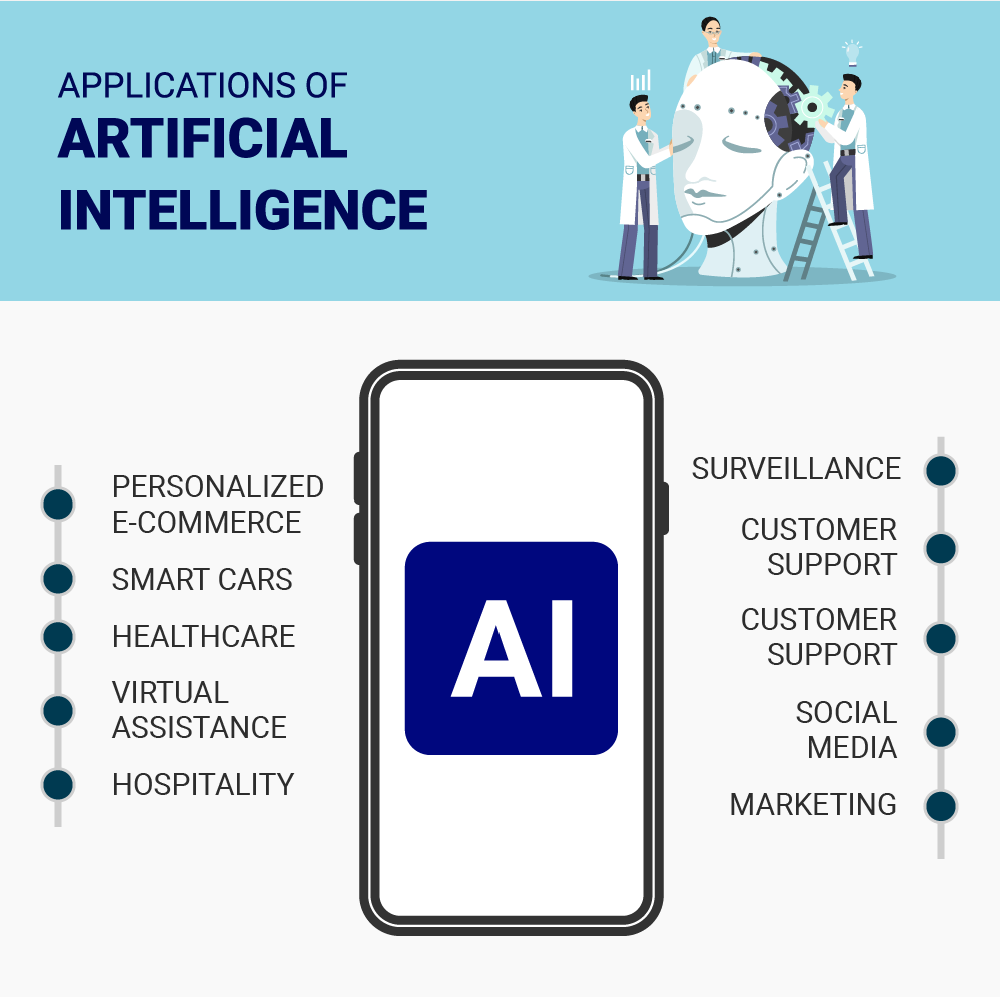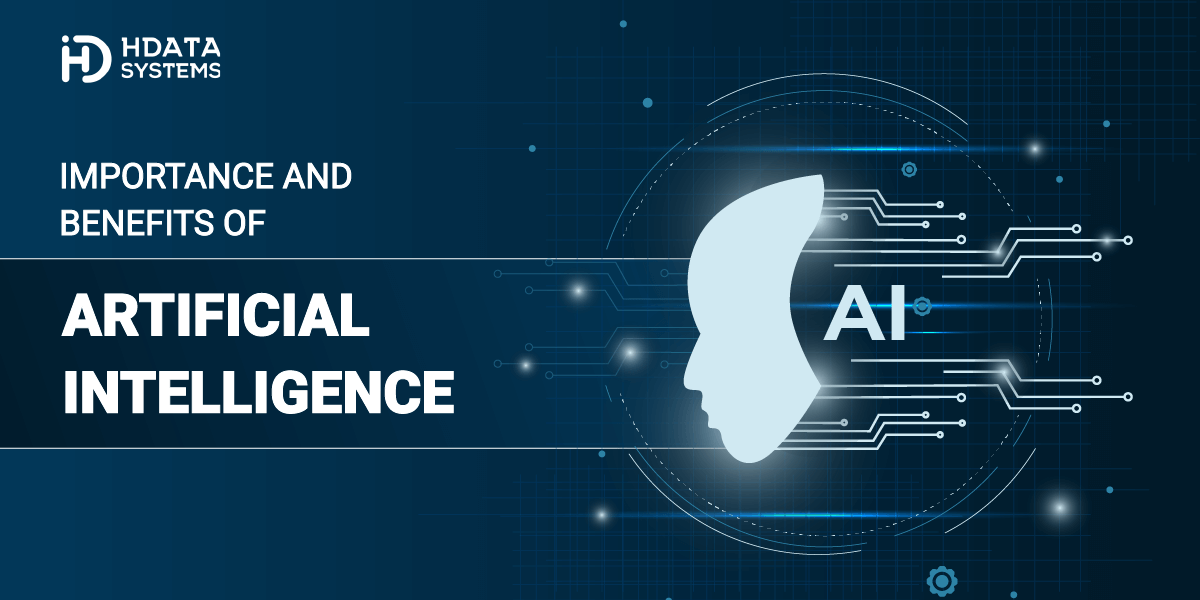Introducing Artificial Intelligence (AI) - Importance & Benefits For The World
Today, the world is dominated by cutting-edge technology, and humans can feel its presence all around. Several advanced technologies have reshaped the world to become a better place to live - mobile apps, artificial intelligence, augmented/virtual reality, blockchain, internet of things, to name a few. Our primary focus in this blog will be '
Artificial Intelligence (AI).'
This intelligent tech is present in several machines, such as mobile phones, automobiles, and smart devices. Mobile phones have AI that helps humans with searches, photos, and other chores. Cars are also AI-equipped, assisting with parking, pedestrians, collisions, etc. There is a fear of AI taking over human jobs, but the fact is that there is always going to be a need for human touch, no matter what.
This Blog Will Cover The Following Things:
- Introduction To Artificial Intelligence (AI)
- The Importance of AI
- Benefits of AI
- Four Types of AI
- Applications of AI
- Artificial Intelligence will Influence the World Positively
Introduction To Artificial Intelligence (AI)
In layman's terms, AI is machines acting human-like. They learn and make decisions just like a human does. These machines can observe, evaluate, and learn from data & errors as a human brain does. AI tech is influencing businesses and has even led to breakthroughs in the medical, retail, hospitality, manufacturing, and finance sectors.
On the other hand,
machine learning (ML), a subset of AI, makes software apps more precise in forecasting results without being specially programmed. It facilitates computers to self-learn from data and implements that learning without human intervention.
The Importance of AI
1. AI Attains Phenomenal Accuracy
AI achieves remarkable precision through deep neural networks, previously impossible. For instance, your interactions with Google Search and Alexa are all deep learning-based that keep getting more precise the more we use them. AI techniques are even used in the medical fields to discover cancer cells on MRIs with high precision as highly trained radiologists.
2. AI Is Reliable & Quick
AI performs frequent, voluminous, and computer-generated tasks reliably. However, for this, human skills are required to set up the system & ask proper questions.
3. AI Adds Intelligence To Products
AI won't be sold as an individual product. Instead, products that you use will be enhanced with AI integration, such as Apple products created a buzz with the Siri feature. Chatbots, automation, and smart devices together with massive data can improve several technologies at home and the workplace.
4. AI Evaluates Deeper Data
With
big data and computing power, it has been possible to develop a fraud detection system which was almost impossible a few years back. You require much data to train deep learning models as they learn straight from the data. The more the data, the more accurate they become.
5. AI Fully-utilized Data
You just need to implement AI in place to get the answers from the data. The role of data is more critical than ever before; it gives an edge over your competitors if you have the best data system in this competitive industry as the best data will win!
Benefits Of Artificial Intelligence

1. No Human Error
AI reduces errors, increasing the chances of accuracy and level of precision. Intelligent machines make precise decisions based on the past information they accumulate over time, implementing specific algorithms.
2. 24*7 Availability
Machines don't need lunch or coffee breaks, unlike human beings. They can work 24*7 without being bored or getting fatigued.
In November 2020, Google introduced Contact Center AI for companies to enhance customer experience. This is a great instance of an AI-based helpline system for companies to address customer queries and resolve issues continually.
3. Unbiased Decisions
Machines have no emotions, unlike emotionally driven humans. AI thinks more practically and has a rational approach. A big advantage of AI is that it does not have biased views, thus ensuring an accurate decision-making process.
4. Quicker Decision-Making
Intelligent machines can make decisions faster compared to humans. You might question the machine's decisions! But as discussed earlier, it makes decisions without any emotions and biased views. This ensures result-oriented decision-making.
For example, IBM's Deep Blue supercomputer makes decisions based on all the possibilities from the opponent's side. However, a human brain cannot fathom so many possibilities like a machine.
5. No Risks
Certain tasks can be hazardous for humans; however, machines can be a great alternative here. For example, allowing machines to handle a natural calamity can result in quicker recovery and lesser pressure on human teams.
This concept arises from Google & Harvard's initiative of building an AI system to forecast the aftershock locations of an earthquake. And after researching several earthquakes and their aftershocks, it displayed a higher degree of precision in pinpointing aftershock locations than conventional methods.
6. Healthcare Applications
AI techniques are highly utilized in the medical field. For instance, AI machines in healthcare devices have helped doctors evaluate the patient's health-related data and risk factors as well. It helps patients know the side effects of various medicines. Moreover, robotics is also used in treating mentally sick patients, such as depression.
At present, there is also software available to detect & monitor neurological disorders and stimulate the human brain's functionality.
7. Managing Recurring Tasks
Repetitive tasks are monotonous in nature. And such tasks can be easily managed with AI's help. Intelligent machines process much faster and can perform several tasks at once to generate the best outcomes. These intelligence machines save a lot of humans, and they can focus on more complex tasks.
Four Types of Artificial Intelligence

AI is a vast term covering different subsets. These subsets can be classified by the tech required. For instance, some need big data, machine learning, or natural language processing. Here, we classify AI into four separate types as similar to Maslov's hierarchy of needs. They are:
- Reactive Machines
- Limited Memory
- Theory of Mind
- Self-Aware
1. Reactive Machines
These machines perform basic operations and the simplest AI type. The type of AI reacts to some input with some output. They can't create memories or valuable info to influence future decisions. They can only respond to currently existing situations. This model saves no inputs; it performs no learning.
Static ML models are reactive machines. They have simple architecture and can be found on GitHub repos. These models can be installed, exchanged, passed around, and easily loaded into a developer's toolkit.
For instance, IBM's Deep Blue analyses cheeseboard pieces and reacts to them based on pre-coded strategies. It doesn't learn or improvise as it plays. It simply reacts.
2. Limited Memory
As the name suggests, this type of AI can retain some data learned from observing past events. It can develop knowledge using that memory jointly with pre-programmed data. Here, the ML model is slightly more complex. Every ML model needs limited memory to be created, but it can be used as a reactive machine type.
For instance, self-drive cars store pre-programmed information such as lane-marking, maps, observing surrounding information like direction and velocity of cars nearby, or the motion of nearby pedestrians.
There are 3 kinds of ML models that achieve Limited Memory, they are:
- Reinforcement learning: They learn to improve predictions through several trial and error cycles. This model is used to train computers how to play games like Chess.
- Long Short Term Memory: To forecast the next element in a chain, LSTM tags more latest information as more significant and those in the past as less significant.
- E-Gan: This model has a memory that evolves at every evolution. This model can give a Growing thing vibe. But, growing things don't fall on the same road everything, the road can get a bit modified. During these modifications, the model may find a better road, a path of least resistance.
Limited memory AI works in 2 ways;
- A team constantly trains a model on new data.
- AI environments are created in a way that models are automatically trained and restored upon usage & behavior.
3. Theory Of Mind
This type of AI is not completely implemented yet. We are only at the nascent stage, and this type of AI model can be seen in self-drive cars. Here, AI interacts with human emotions and thoughts.
Humans have emotions, feelings, and memories that influence their behavior. This is the psychology based on which researchers hope to develop robots able to imitate human mental models.
For instance, a world-renowned robot, Sophia, built by Hanson Robotics, often attends press tours as an example to showcase what robots can do. Sophia cannot determine or understand human emotions, but can have an introductory conversation, has image recognition, and an ability to respond to human interactions with proper facial expressions and a human-like appearance.
Experts have yet to develop a theory of mind tech, without which Sophia is just a chatbot with a face.
4. Self-Aware
These are the most complex AI machines that are envisioned by the experts and are their ultimate AI goal. These machines have human-level awareness and understand their existence in the world.
As a self-aware machine, it would not just know of its inner state but can predict the feelings of others around it. For example, as humans, if someone weeps before us, we know they are upset, as we understand how we feel when we cry.
Self-aware machines seem like a sci-fi thing at present, and perhaps they might never exist. But you never know! Ages before, did we even know AI would exist? But certainly, the development of such an AI would be reaching the next level of innovation in the tech sector; it would be mind-boggling!
Applications Of Artificial Intelligence

There are endless examples of how AI has impacted our lives. Let's go through them one at a time.
- Personalized e-Commerce
- Smart Cars
- Healthcare
- Virtual Assistance
- Hospitality
- Surveillance
- Customer Support
- Social Media
- Marketing
- Many more
1. Personalized e-Commerce
E-commerce stores or online shopping platforms are the biggest platforms to apply the personalization factor of AI. The recent AI applications use AI-based algorithms to showcase the list of buying suggestions and filtrations to users based on the data they gather by going through their recent search history or purchased products.
2. Social Media
Social media is an omnipresent platform for the current generation. An innumerable amount of data is generated through tweets, chats, posts, etc. Wherever there is a lot of data, AI and ML are always involved.
The standard use of
AI in social media platforms is for facial verification and detect facial features. Snapchat is a very famous example of this feature.
In social media, deep learning is used to pull each minute detail from a picture by using deep neural networks. Whereas ML algorithms design your feed based on your interests.
3. Surveillance
AI is trained using supervised exercise, identification protocols, building security algorithms, and much more to take input from security cameras. Ultimately AI can recognize potential threats and alert human security officers to probe further.
AI has hugely evolved in the security field and can spot several threats like unknown individuals on-premises, invalid access, intruders, etc. AI is expected to be a significant asset worldwide in this field in the coming ten years.
4. Customer Support
Several websites offer customers the ability to chat with customer support. It is one of the most general uses of AI. These chatbots are a bit more than automated responders. The more advanced version can extract information from the site and display it to you on request.
Training a machine to understand the human language is difficult. Quick advances in natural language processing mean they are progressing by absorbing information constantly.
5. Healthcare
This sector has one of the top AI adopters. AI has critically stepped in to help people with looking after patients.
The automated bots & healthcare apps guarantee proper medication & treatment of patients. AI has also been used to help doctors in operations or surgeries.
6. Smart Homes
AI applications are being implemented in homes and getting smarter each day. Several devices such as smart switches, locks, doors, etc., are becoming popular and smart homes is becoming more available to the general population.
For instance, thermostats & building management systems can automate building cooling and heating. They learn and can anticipate when to turn the boiler on/off for optimal comfort, considering the outside weather conditions as well.
7. Smart Cars
Self-driving cars are the most common instance of AI used in the real world. Advanced deep learning algorithms can precisely forecast what objects in your vehicles surrounding will likely do.
AI systems gather data from vehicles' radar, GPS, cloud services, and cameras to produce control signals that run the vehicle. Some costly vehicles come with AI parking systems already.
8. Agriculture
Businesses use automation and robotics tech to help farmers find more efficient ways to secure their crops from numerous elements such as market consumption rates, weeds, weather, etc.
The advanced AI applications like image recognition spot possible defects in the crop through photos captured by the user's mobile phone camera; later, users are offered soil restoration techniques and other solutions to manage the recognized defect.
Artificial Intelligence Will Influence The World Positively
AI has enormous potential for creating the world a better place. Human needs will always be as important as they were in the past; it will be up to them to ensure that AI does not go out of control. The user demands have significantly risen, and not having AI tech in place will only lead to outdated technologies and business failure. This calls for the need to implement advanced technologies and AI literacy to prosper in the competition.
Take A Glance,
Harnil Oza is a CEO of HData Systems - Data Science Company & Hyperlink InfoSystem a top mobile app development company in Canada, USA, UK, and India having a team of best app developers who deliver best mobile solutions mainly on Android and iOS platform and also listed as one of the top app development companies by leading research platform.



